

Search Content. Hunt is on for new Planet Nine For a planet that hasn’t technically been discovered yet, Planet Nine is generating a lot of buzz.
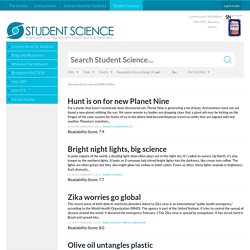
Astronomers have not yet found a new planet orbiting the sun. Yet some remote icy bodies are dropping clues that a giant orb may be lurking on the fringes of the solar system.Six hunks of ice in the debris field beyond Neptune travel on orbits that are aligned with one another. Planetary scientists... 16:40 PM, February 3, 2016 Planets, Mathematics Readability Score: 7.9 Bright night lights, big science In polar regions of the world, a dazzling light show often plays out in the night sky.
It's called an aurora. Up North, it’s also known as the northern lights. Cookies. Please ensure you have JavaScript enabled in your browser.
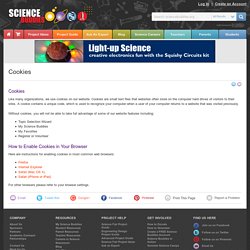
If you leave JavaScript disabled, you will only access a portion of the content we are providing. <a href="/science-fair-projects/javascript_help.php">Here's how. </a> Cookies Like many organizations, we use cookies on our website. 40 Cool Science Experiments on the Web. Perhaps you don't have enough class periods to do every science experiment you wish you could, or maybe your budget for beakers and baking soda is all tapped out.
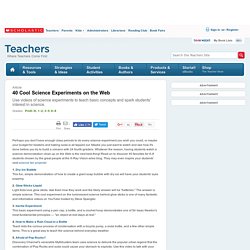
Maybe you just want to watch and see how it's done before you try to build a volcano with 24 fourth-graders. Whatever the reason, having students watch a science demonstration close up on the Web is the next best thing! Read on to discover 40 favorites for K-8 students chosen by the great people at the X-Ray Vision-aries blog. They may even inspire your students' next science fair projects! 1. 2. 3. 4. Main. The scale of the universe. Apps for Smartphones and Tablets. Wind and Storage. Use this applet to explore some issues related to generation, demand, and transmission of electricity.
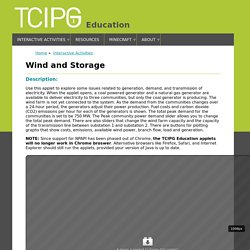
When the applet opens, a coal powered generator and a natural gas generator are available to deliver electricity to three communities, but only the coal generator is producing. NOVA Labs. For discussion questions and lesson plans, go to the Energy Lab collection on PBS LearningMedia.
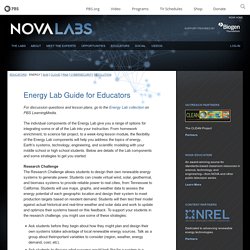
The individual components of the Energy Lab give you a range of options for integrating some or all of the Lab into your instruction. From homework enrichment, to science fair project, to a week-long lesson module, the flexibility of the Energy Lab components will help you address the topics of energy, Earth’s systems, technology, engineering, and scientific modeling with your middle school or high school students. Below are details of the Lab components and some strategies to get you started. Research Challenge The Research Challenge allows students to design their own renewable energy systems to generate power. Ask students before they begin about how they might plan and design their own systems totake advantage of local renewable energy sources.
Science education for global citizenship. Sign in - Google Accounts. Sign in - Google Accounts. Sign in - Google Accounts. Science education for global citizenship. ClimateChangeLIVE - Lesson Plans. <cite>The Globally Competent Teaching Continuum</cite> - Introduction - The Globally Competent Teaching Continuum. LEARN NC is evaluating its role in the current online education environment as it relates directly to the mission of UNC-Chapel Hill School of Education (UNC-CH SOE).
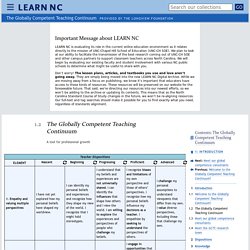
We plan to look at our ability to facilitate the transmission of the best research coming out of UNC-CH SOE and other campus partners to support classroom teachers across North Carolina. We will begin by evaluating our existing faculty and student involvement with various NC public schools to determine what might be useful to share with you. Don’t worry! The lesson plans, articles, and textbooks you use and love aren’t going away. They are simply being moved into the new LEARN NC Digital Archive. Citizen Science. STEMscopes.
Brunsell-claims-evidence-reasoning.pdf. Mars Science Laboratory - Curiosity. The Science of Curiosity: Seeking Signs of Past Mars Habitability. Business Car Manager. Ten Websites for Science Teachers. We all know that the web is full of excellent web resources for science teachers and students. However, unless you live on the web, finding the best websites can become quite a challenge. This isn't a "Top Ten" list -- instead, it is a list of websites that I either use on a regular basis or just find interesting. Pinterest. MSL. Designing Science Inquiry: Claim + Evidence + Reasoning = Explanation. In an interview with students, MIT's Kerry Emmanuel stated, "At the end of the day, it's just raw curiosity.
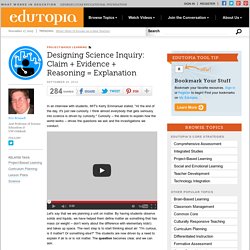
I think almost everybody that gets seriously into science is driven by curiosity. " Curiosity -- the desire to explain how the world works -- drives the questions we ask and the investigations we conduct. Let's say that we are planning a unit on matter. By having students observe solids and liquids, we have helped them define matter as something that has mass (or weight -- don’t worry about the difference with elementary kids!) And takes up space. Is air matter? Designing Science Inquiry: Claim + Evidence + Reasoning = Explanation.